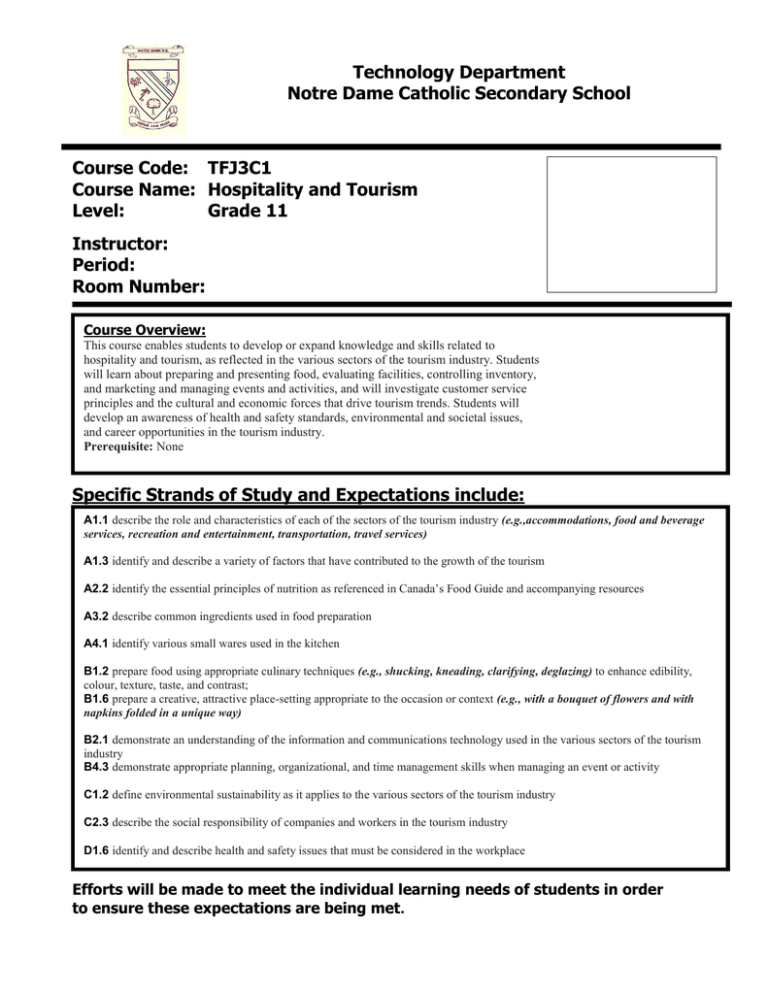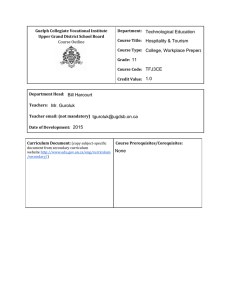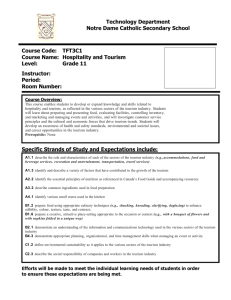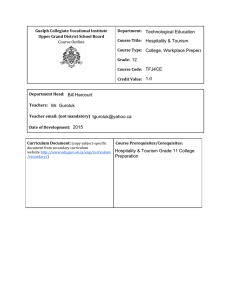Technology Department Notre Dame Catholic Secondary School Course Code: TFJ3C1
advertisement

Technology Department Notre Dame Catholic Secondary School Course Code: TFJ3C1 Course Name: Hospitality and Tourism Level: Grade 11 Instructor: Period: Room Number: Course Overview: This course enables students to develop or expand knowledge and skills related to hospitality and tourism, as reflected in the various sectors of the tourism industry. Students will learn about preparing and presenting food, evaluating facilities, controlling inventory, and marketing and managing events and activities, and will investigate customer service principles and the cultural and economic forces that drive tourism trends. Students will develop an awareness of health and safety standards, environmental and societal issues, and career opportunities in the tourism industry. Prerequisite: None Specific Strands of Study and Expectations include: A1.1 describe the role and characteristics of each of the sectors of the tourism industry (e.g.,accommodations, food and beverage services, recreation and entertainment, transportation, travel services) A1.3 identify and describe a variety of factors that have contributed to the growth of the tourism A2.2 identify the essential principles of nutrition as referenced in Canada’s Food Guide and accompanying resources A3.2 describe common ingredients used in food preparation A4.1 identify various small wares used in the kitchen B1.2 prepare food using appropriate culinary techniques (e.g., shucking, kneading, clarifying, deglazing) to enhance edibility, colour, texture, taste, and contrast; B1.6 prepare a creative, attractive place-setting appropriate to the occasion or context (e.g., with a bouquet of flowers and with napkins folded in a unique way) B2.1 demonstrate an understanding of the information and communications technology used in the various sectors of the tourism industry B4.3 demonstrate appropriate planning, organizational, and time management skills when managing an event or activity C1.2 define environmental sustainability as it applies to the various sectors of the tourism industry C2.3 describe the social responsibility of companies and workers in the tourism industry D1.6 identify and describe health and safety issues that must be considered in the workplace Efforts will be made to meet the individual learning needs of students in order to ensure these expectations are being met. Course Breakdown Resources: Unit 1. Hospitality and Tourism Fundamentals The Tourism Industry 15 hours Unit 2. Hospitality and Tourism Skills Food Prep and Presentation 45 hours Unit 3. Industry Practices, the Environment, And Society 30 hours Unit 4. Professional Practice & Career Opportunities Health and Safety 20 hours The course will use a variety of resources including video, CD-ROM, Internet Applications and a variety of print sources. The textbook Culinary Essentials will be made available to students during the first week of the course. The text and all other resources assigned to students are the responsibility of the student. Any damage incurred will result in payment for replacement. Replacement cost for the text is $80.00. Evaluation Structure:: Knowledge/Understanding Thinking/Inquiry Communication Application 20% 20% 25% 35% The above is reflected both in the term work (worth 70% of the final mark) and the summative work (worth 30% of the final mark). Summative work consists of the Final Exam (15%) and a Culminating Performance Task (15%). Evaluation Policy Students will be assessed & evaluated according to the work produced & skills displayed. Methods of providing feedback will include assessing work in process & evaluating completed assignments, tests, co-operative learning activities, simulations and presentations. Peer & self-evaluations will also be utilized. Student marks will be determined by evaluating process & product according to 4 categories & 4 levels. Please see the chart below for specific skills and key words used to determine student competency in the different categories. Level Category Knowledge/Understanding Knowledge of facts & terms Understanding of concepts & relationships Thinking/Inquiry Critical thinking skills Creative thinking skills Inquiry Skills Communication Communication of ideas and information Use of symbols & visuals Oral & written communication Level 1: 50-59% Level 2: 60-69% Level 3: 70-79% Level 4: 80-100% -Limited display of knowledge, skills and ability to apply concepts -Some success in displaying knowledge, skills and application of concepts -Considerable display of knowledge skills and ability to apply concepts -Thorough understanding of concepts and ability to communicate, think creatively and apply concepts Application Applications in familiar contexts Transfer of concepts to new contexts Making logical conclusions and predictions Use of technology Making connections Feedback will also be provided for student learning skills. Skills like working independently, team work, organization, work habits and homework, and initiative are assessed independently student achievement and will be conducted through the use of a rubric indicating specific criteria to be achieved to receive each of the following letter grades: E –Excellent Other Evaluation Issues G – Good S – Satisfactory N - Needs Improvement LATE ASSIGNMENTS. Assignments submitted after the Primary Due Date established by the teacher will be accepted with a penalty of 5% off for the first day late, 3% for the second day late, and 2% for the third day late. This three day Penalty Zone is the maximum time allowed for submissions. The third day after the assignment is due is considered the Closure Date upon which no further assignments will be accepted. If the teacher returns the marked assignments within the four day penalty zone, the date of return is considered the closure date. Repeated lateness in submissions indicates poor organization skills and will result in parental contact and will be reflected in the learning skills section of the report card. INCOMPLETE ASSSIGNMENTS Assignments will be graded according to the extent with which they meet the criteria established in the rubric or evaluation structure. MISSED TESTS Tests missed with a legitimate reason will be written within a few days of the student returning from the absence. Student eligibility to write the test and the date of writing will be at the discretion of the teacher in consultation with the department head. CULMINATING ACTIVITIES These activities will be due toward the end of the course. They are valued at 15% per cent of the final mark and will reflect course material and competencies not otherwise reflected on the final exam. Plagiarism in any form reflects academic dishonesty and will result in a mark of zero for the assignment in question




